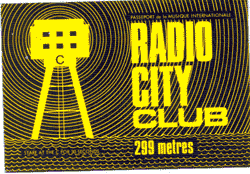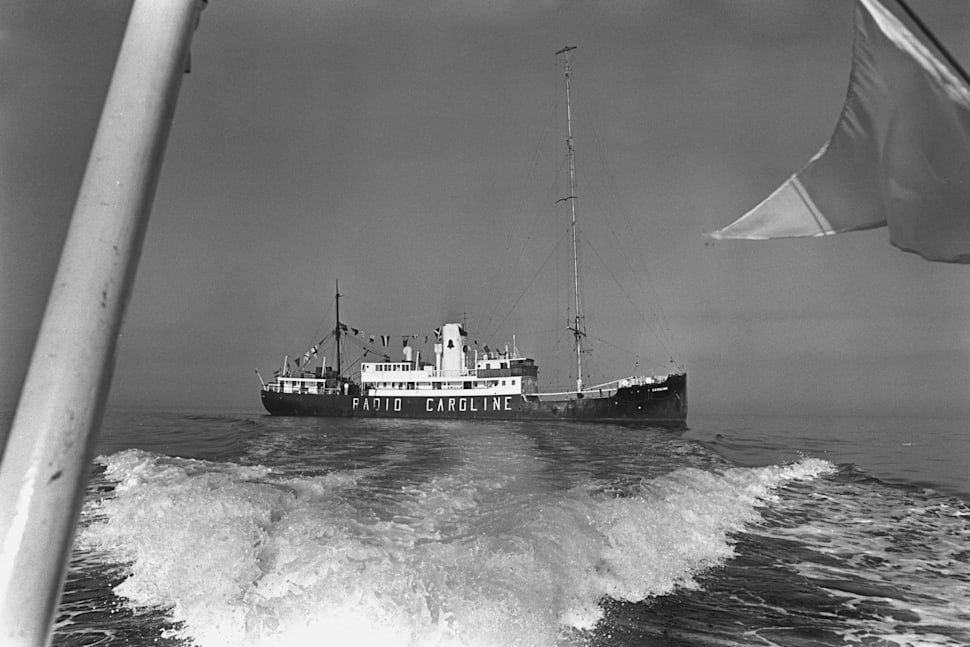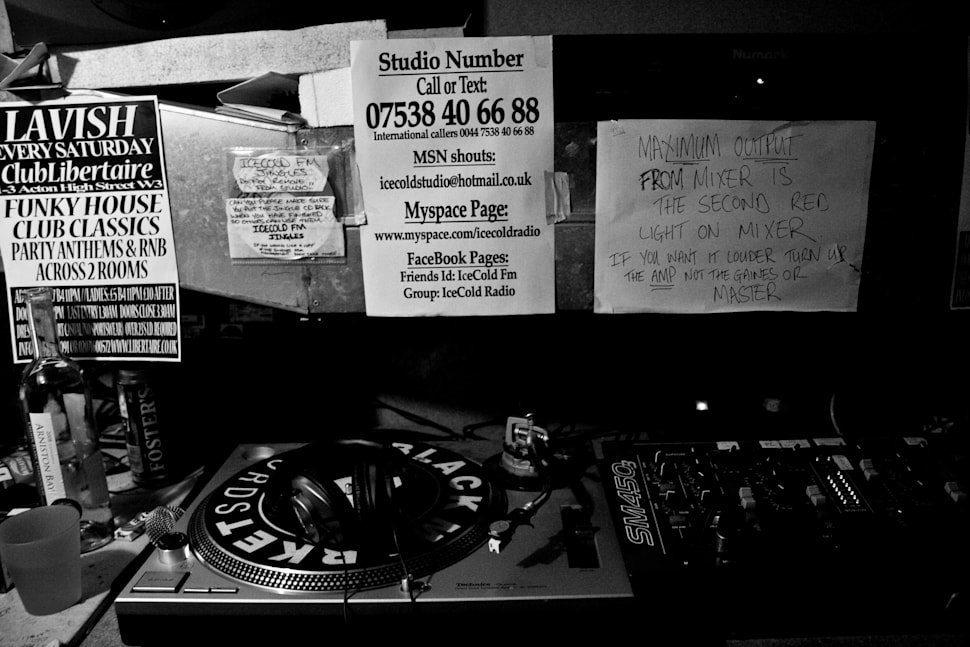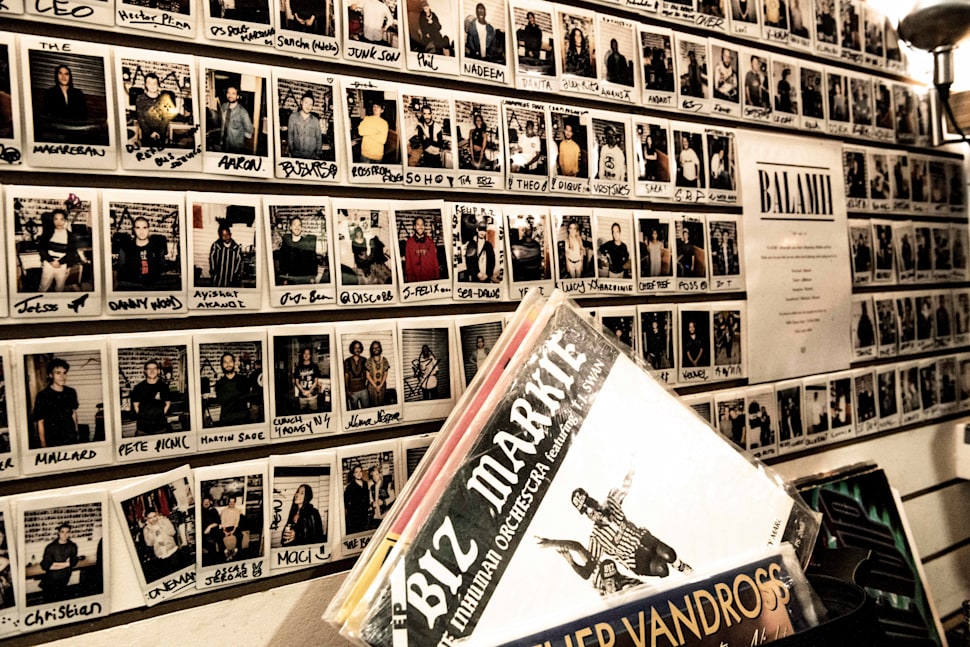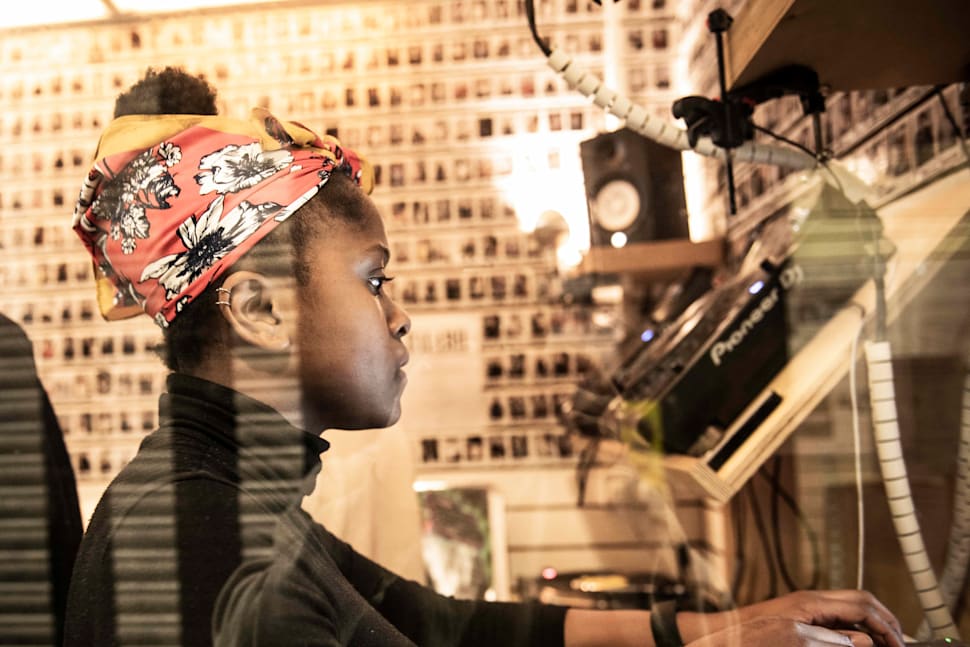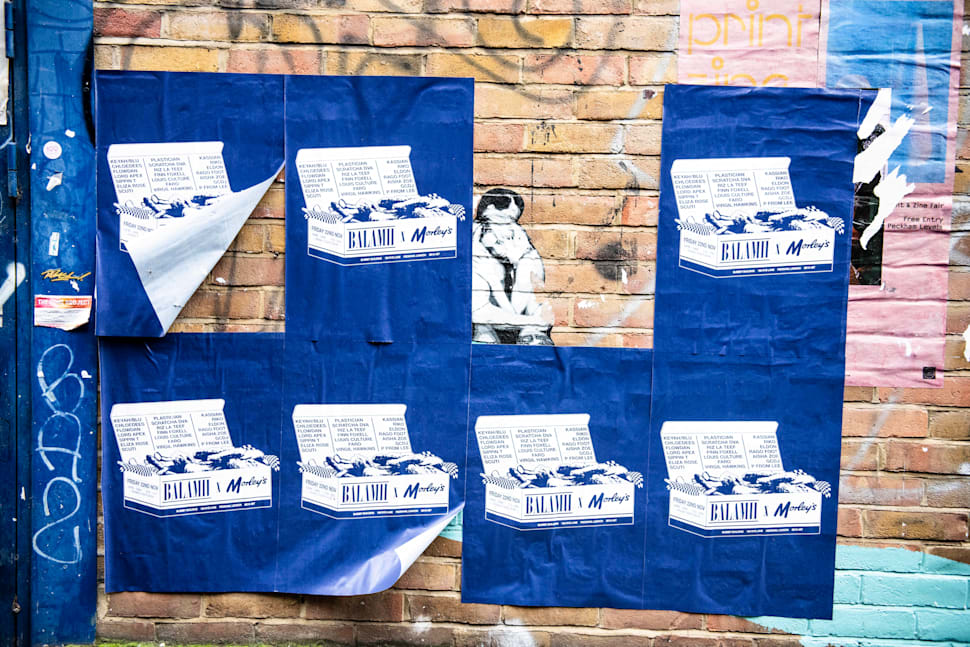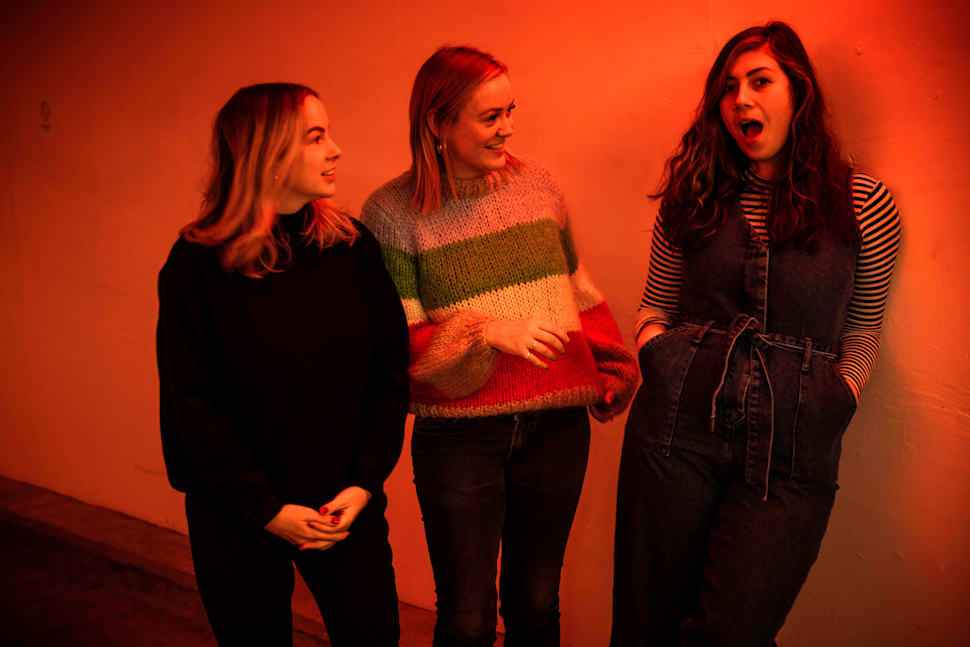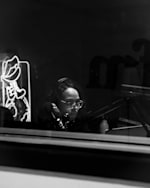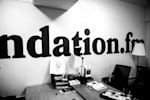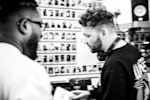Wednesday, 30 September 2020
Poster Mini Brief
poster brief
encourage people to utilise the tools available to them to broadcast
internet has made it really easy to put content out - can be used by anyone
independent musicians should be encouraged to stream their own music
people can share their opinions and thoughts with a wide audience, free of censorship
this is all done digitally, no need for ocean liners or stringing ariels up on tower blocks
emphasise how simple it is to broadcast your own content
audience: independent musicians, creatives, thinkers, who may be overlooked by mainstream radio.
IDEAS
- simple how to guide showing people how they can broadcast themselves
- poster showing history of pirate radio > boats > tower blocks > laptop
- juxtaposing images depicting pirate radio as negative with images showing its positive impact
-'tune in' propaganda style posters, tongue in cheek. - could make it look government official to mock ofcom.
Tuesday, 29 September 2020
Intro to 504 - initial ideas
Brief: ***
things to include/ experiment with:
Kinetic type
audio
Answer:
what is the purpose of the website?
What content will be included?
What will make a user want to visit the website?
what is your question?
what are your rules?
what are your experiments?
Monday, 21 September 2020
Summer Task - Pirate Radio Stations
What is a pirate radio station?
-a pirate radio station is a radio station that broadcasts without a valid license
Why did they begin?
-people began broadcasting from off shore sites (boats or sea forts) as a loophole to avoid needing a broadcasting license, as they weren't technically in the country requiring such licenses.
-the stations could play whatever music they liked, such as pop and rock music, which was not played by the BBC at the time (1960s)
"Nightclub owner and music manager Ronan O'Rahilly was frustrated by the hold that major record labels and other organisations had over BBC radio, and decided to take them all on by broadcasting illegally from a boat off the east coast of England. Radio Caroline started transmitting in 1964, and teenagers in the UK and large parts of Western Europe were able to hear modern pop, rock, jazz and soul on their radios for the first time."
-in the 80s a new generation felt they weren't being represented on the airwaves, and pirate radio stations catered for the UKs black community.
Why was it so popular?
-a lot of young people tuned in as they weren't interested in the broadcasts by the BBC and wanted to listen to rock and pop music
-people could write in with requests for songs to be played
-a lot of the DJs were very charismatic and gained big fan bases
-there was a sense of community amongst listeners and DJs
Facts
-In reaction to the popularity of pirate radio, BBC radio was restructured in 1967, establishing BBC Radio 1, Radio 2, Radio 3 and Radio 4. A number of DJs of the newly formed Radio 1 came from pirate stations.
-home-made transmitters were sometimes constructed inside biscuit tins so they could be hidden in raids.
-The 1970s and 1980s saw a wave of land-based pirate radio, broadcasting mostly in larger towns and cities, transmitting from flats and tower blocks. These included community-focused local stations as well as stations emerging for the first time to specialise in particular music genres.
-In London, a notable moment would be the launching of Britain's first black owned music station Dread Broadcasting Corporation (DBC) in 1980. DBC played reggae and soca as well as other black music
-the growth of pirate radio in the 1980s was so rapid that at one point pirate radio operators outnumbered legal broadcasters
-Although UK pirate radio has in the main concentrated on broadcasting music not catered for by the mainstream, there has been some overt political pirate radio.
-The earliest of these was Radio Free Scotland, which hijacked the sound channels of BBC television after closedown.
-Similarly, Voice of Nuclear Disarmament would do the same for a short period in the early 1960s in London.
-In 1982, Our Radio was broadcasting music, anarchism, and other left wing views to London. Our Radio once evaded arrest by setting up a dummy antenna for the Home Office to find.
-During the 1984–1985 miners' strike, Radio Arthur operated in the Nottinghamshire area.
-Political programming has been a feature of the many black community pirate radio stations that have grown in the UK since the 1980s. For the likes of Galaxy Radio, part of their mission is to: "de-brainwash the black community". The station combines reggae and soca with robust articulation of "black empowerment against a system designed our oppress our brothers and sisters" and live phone-in discussions
-pirate radio was important in popularising many underground UK music genres such as jungle, acid house and grime, which mainstream radio stations wouldn't play.
-The stations gave immigrant communities programming in their native languages, championed local interests, and provided a platform for alternative music
-“I think there’s the same energy behind it as there was with pirate radio, but internet radio is that step between pirate and mainstream. You’ve got their freedom, but you’re still legit. You hear the stories about the pirate radio stations in the ’90s where you’d have to get a coat hanger to be able to listen to it, or the police would turn up and [the station owners] would have to pack up their gear and just leg it. Obviously, we’re in a space where this is a proper thing and we’re a company, but we’re still not creatively limited by anything. We can work with who we want and put whatever we want on air, which is an amazing place to be.” - Ami Bennett, Foundation FM founder
-"It’s still a form of protest, because you’re occupying space,” says Shy One. “Mainstream radio is very status quo: there’s no form of expression in there, and it’s all very contrived and programmed and strictly regulated. When people are independently creating and taking up space in the same medium, what they’re actually doing is making a really obvious, non-violent protest. One that is pro-community and pro-culture.” - Shy One
-"At the beginning of the 1990s there were more than 500 illegal stations broadcasting in the UK"
sources:
http://www.offshoreradio.co.uk/
https://en.wikipedia.org/wiki/Pirate_radio_in_the_United_Kingdom
https://www.ofcom.org.uk/__data/assets/pdf_file/0021/7239/factsheet.pdf
https://www.redbull.com/gb-en/theredbulletin/pirate-radio-djs-2020
https://www.redbull.com/gb-en/a-brief-history-of-pirate-radio-stations
https://www.redbull.com/gb-en/hattie-collins-how-pirate-radio-shaped-grime
https://www.redbull.com/gb-en/11-photos-pirate-radio
https://www.dazeddigital.com/music/article/34394/1/pirate-radio-history-and-future
https://pirate.ie/archive/
https://greatwen.com/2015/06/04/pirate-radio-in-london-the-clash-keith-allen-and-biscuits/
https://www.irishtimes.com/news/ireland/irish-news/transistors-in-biscuit-tins-a-look-back-at-the-heyday-of-pirate-radio-1.3649292
Radio City's Shivering Sands fort
Rebel sounds: A brief history of pirate radio in the UK
1930s
1960s
1980s
Early 1990s
Late '90s and 2000s
The history of UK pirate radio – and why it’s still here
The influence of pirate radio has endured despite government crackdowns and the rise of legitimate alternatives – today, it continues to thrive, both legally and otherwise
The UK’s pirate radio story starts with Ronan O’Rahilly’s Radio Caroline back in the 1960s, famously avoiding the authorities by broadcasting from international waters, but it was really the 1990s that paved the way for pirate radio in this country. Its evolution loosely follows that of the underground rave scene, which mainstream radio wouldn’t touch in its early days. “It’s the closest thing to mass organised zombie-dom,” BBC Radio 1 DJ Peter Powell said of acid house. “I really don’t think it should go any further.” Needless to say, it wasn’t going anywhere, and between 1988 and 89, pirate radio stations rapidly started to appear to serve a youth hungry for new sounds that weren’t being catered to by mainstream radio. By 1989, there were over 60 pirate radio stations operating in London alone.
While the first pirates – from Sunrise to Centreforce to Fantasy – mostly played music from America and European countries like Belgium, it didn’t take long for the British youth to start doing their own thing. “The UK kids realised people were making music in their bedrooms and they thought ‘I can fucking do that!’” exclaims Uncle Dugs, one of the UK’s leading authorities on pirate radio. Having been involved in radio (both legal and otherwise) for over 20 years, Dugs’ new book Rave Diaries and Tower Block Tales documents life as a young raver turned award-winning DJ after years on the pirate scene. As he explains, by 1991, London’s underground music landscape had become “99% UK producers and DJs,” transforming from acid house to hardcore and then to jungle. As London’s underground grew, so did its pirate presence, with legendary stations like Weekend Rush, Kool FM, Pulse FM, Innocence, and Defection springing up by the end of 1991. “You could flick through the radio and at every .2 on the dial there was a pirate station,” Dugs laughs. “There wasn’t even space on the radio for a new one.”
“If you weren’t accepted in other walks of life, pirate gave you the feeling of, ‘It’s me and my mates against the world’” – Uncle Dugs
“It was all about sharing new music,” adds Chef, another pirate radio OG and Kool FM resident for 12 years. “We were like, ‘There’s this new thing, and it’s our thing. I want everyone to know about it.’” As those people got sucked into the world of pirate radio, stations became more than just places to play music. “You became part of the station, so you started having to go up with them on the roof, carrying scaff poles for the aerials. You’d be up there in the night, with the wind blowing a force ten gale and someone on the phone going, ‘Left a bit, right a bit. Stand still!’” For kids coming from council estates, the radio provided a sense of camaraderie. “If you weren’t accepted in other walks of life, pirate gave you the feeling of, ‘It’s me and my mates against the world,’” Uncle Dugs says. “It was definitely a ‘council estate of mind,’” adds Chef.
People were willing to risk it all to get on air and stay there 24 hours a day. “It’s probably stupid in most people’s eyes,” Dugs says. “But being on meant more than anything. You couldn’t be off, even if it meant risking your life.” And for listeners? Chef calls it the very first social media platform. Pirates were fresh. They came from local communities and had their fingers on London’s pulse. “It was the first place to get information about what was going on,” Chef says. Mainstream outlets couldn’t keep up because they weren’t getting the first taste of new sounds from estates. “In 92, I was hearing stuff like Acen’s ‘Trip II The Moon’ and other massive rave tunes on legal radio,” Dugs recalls, “but they only supported really big songs.” By 93, producers were playing with hardcore, blending it with ragga, hip hop, and soul, and jungle emerged. Kool FM stepped into the limelight, serving as the capital’s leading pirate station for the next few years. Kool championed jungle tracks still famous today like UK Apache’s “Original Nuttah” and “The Helicopter Tune” by Deep Blue. Within two years of being on the dial, Kool changed the game, becoming a worldwide phenomenon through tape swapping. “I know of people who drove for hours to get into the catchment area to listen to that station,” Dugs says, somewhat incredulously.

1994 saw the birth of arguably the most recognisable name from the pirate radio era, Rinse FM. Founded by east London natives Slimzee and Geeneus, Rinse started in the same way that all pirates did – young people making something for themselves. “They wanted to be jungle DJs and MCs, and none of them could get on Kool,” Dugs explains. “When they started, they didn't have a clue. The first aerial they put up was on a broom handle.” Starting life as a jungle station, Rinse could never compete with Kool’s monopoly on the music – but luckily UK garage, London’s latest darling genre, started to grow during the station’s formative years, giving them the chance to step up and push this new sound. Garage MCs like Creed, Blakey, and Charlie Brown were making names for themselves in the city, but younger aspiring MCs found themselves locked out. “The older guys didn’t want the younger guys on with them,” says Dugs. “Creed would be bubbling nice and then Wiley would come on a hundred miles an hour talking about killing everyone.”
And that’s how grime started to emerge. Having overseen grime’s introduction to the station, Dugs is well positioned to talk about Rinse’s relationship with the genre. In much the same way that pirate stations were a reaction against mainstream radio programming, Rinse was essential for giving space to grime when other stations wouldn’t embrace it. Partly, this was because the station was run by people from the same postcodes as many of grime’s earliest MCs. “While other stations might not understand if an MC was talking about guns or muggings or violence, because they had all grown up together, Rinse got it,” Dugs explains. “No one else was going to say, ‘Hey, there’s this 16-year-old called Dizzee Rascal, let’s give him a show on Radio 1.’”
“We’re doing good radio, but we’re a community too... even when people aren’t playing, you’ll find them on the sofa drinking tea” – Harriet Taylor, Radar Radio
Throughout pirate radio’s history – but particularly with the genesis of grime – pirate was viewed frostily by the mainstream. On top of the Department of Trade and Industry’s (DTI) mission to eradicate pirates from the airwaves, the communities themselves were under attack. The media painted pirates as an underground drug/gangster movement, with a cycle of violence perpetrated by the music they promoted. One rumour was that pirates were drug kingpins selling on air through coded messages. “They said they were shifting hundreds of pounds a day,” Dugs says, “Like, are you for real? It was total bollocks.” Mainstream radio wasn’t totally oblivious to the music’s popularity, however, and Radio 1 launched 1xtra to cater for underground tastes in 2002 – although Chef is contemptuous. “They realised there was an urban pound note – they saw the pirates as feeders,” he says. “Why build your own fanbase when there’s something already established?” While Dugs and Chef both agree that the mainstream might not be perfect, seeing artists like Skepta, JME, Dizzee Rascal, Wiley, and others come up through the pirate scene and gain superstardom makes them feel their job as a station is done.
Today, the spirit of those old FM pirates has been embraced by a new generation of online stations, like Reprezent and Balamii in south London and Radar Radio in east. Radar’s station manager Ben Fairclough gives a simple explanation as to why pirate-style radio continues to thrive: “Tune into Kool, or Rinse, or Radar and you’ll hear something different,” he says. Radar’s staff grew up listening to pirate radio and try to capture that energy in their own programming, even if the nature of the station is vastly different. “You can do pirate stuff without being illegal, which has opened the gates,” says senior development manager Gavin Douglas. “If you’re streaming independently online, you can do whatever you want.” By the time mainstream radio starts hyping an artist, it’s likely these stations will already have had them on – Reprezent, for example, was crucial for spotlighting artists like Stormzy and Novelist, and at Radar, big names like Dizzee Rascal have come through while legends like Ray Keith continue to make magic. But the stations are also a hotbed of young talent – kids who weren’t even been born when pirate ruled the airwaves – often acting as a community hub as much as a radio station. “We’re doing good radio, but we’re a community too,” laughs Harriet Taylor, another of Radar’s managers. “It’s such a vibe. Even when people aren’t playing, you’ll find them on the sofa drinking tea.”
By broadcasting legally online, stations from Radar to Rinse to NTS have built identifiable brands that are recognisable on t-shirts, festivals, and clubnights around the city (and, increasingly, around the world). With this comes commercial and brand partnership opportunities that are inaccessible to pirates – but that doesn’t mean there aren’t still stations broadcasting illegally, if you know where to look. Imaginary Forces is an experimental producer/DJ who cut his teeth DJing drum’n’bass on the pirate scene in the 1990s, and he continues to float between legal and pirate radio today. “I’m not gonna say any names of pirates still broadcasting,” he grins. “It does them damage, and while I can handle myself, I don’t want a few man turning up at my door.” For a generation dependent on the internet, finding pirate stations on Google won’t bear much fruit. “Obviously none of them advertise,” he adds. “The only way is word-of-mouth, or do a radio scan. You’ll find them. You can still spot rigs and aerials. They’re still there – even the ones that have been denying it for the past ten years. Pirate will never stop; it’s cyclical. If you push people hard enough, they’ll find a mode of expression. The internet has been pretty cool for that, but it’s not the be-all-and-end-all.”
“There always is and there always has been pirate radio. It never went away – people just lost track of it” – Imaginary Forces
Imaginary Forces is clear about the differences between new generation internet stations and pirate radio. One of them is audience interaction: while quick to say that playback is something he’s into, he feels that the nature of internet stations (where shows are often pre-recorded) means that a crucial element is often missing. “Radar and NTS are cool, but these stations can’t ever capture the pirate vibe,” he says. “On pirate, people have to tune in to listen. You can do shout-outs. I love that.” He also sees a lack of identity in stations that play a spread of music, rather than honing in on one genre – though he’s doesn’t necessarily see this as a negative. “It’s great, because now the youngers are going to the internet stations. They’re full of young people keen for new stuff.” Nevertheless, modern day pirates are generally genre-specific, allowing their DJs to showcase various permutations of any one style. “Pirates can have a stronger, deeper focus on particular niche areas. They can show you the full spectrum of that music.”
Fundamentally, the illicit nature of pirate is key. Even though illegal broadcasters aren’t targeted so relentlessly today, there’s still a risk in broadcasting. “There’s an edge missing, that rough-and-ready, DIY feeling,” says Imaginary Forces. “If I go up pirate, I’m hiding my bag of records. It’s still very covert.” It’s a world away from the increasing professionalism of online stations and former pirates alike. “(Most) pirates don’t have aspirations to become the next Rinse. They want to stay pirate. The managers are very singular individuals; they’re a breed apart.” Despite the legwork, the costs, and the legal risks, pirate radio stations are just as obsessed with broadcasting on the airwaves today as they have been for decades. Knowing this adds an air of weight to what Imaginary Forces says next. “There’s no doubt in my mind that there are young people out there doing stuff. New stations come and go all the time, literally overnight. There always is and there always has been pirate radio. It never went away – people just lost track of it."
RAVE DIARIES & TOWER BLOCK TALES - Uncle Duggs
HOW PIRATE RADIO WENT DIGITAL: MEET THE REBEL DJS FORGING AHEAD IN 2020
Independent radio is a form of protest, because you're occupying spaceShy One































